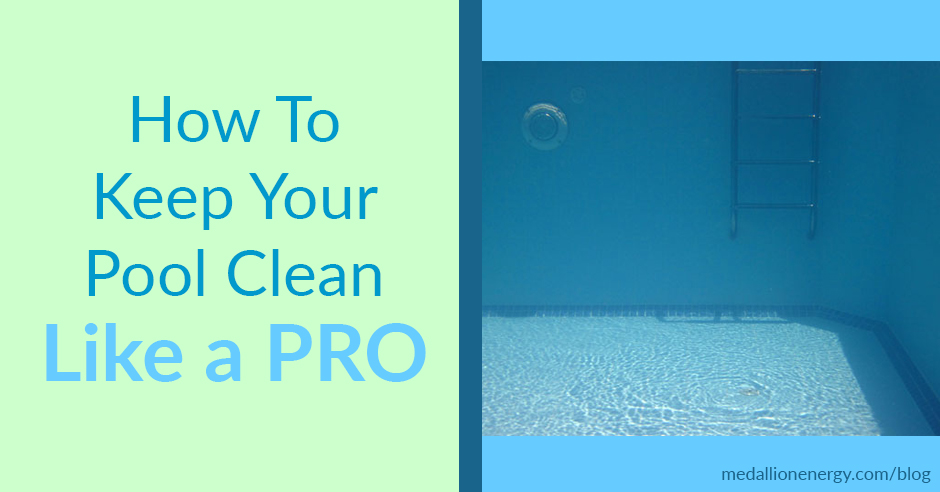Keeping your pool clean like a pro is much simpler than you might think. As nearly every pool owner knows, being consistent is the key.
Routine pool maintenance is the most reliable way to make cleaning your pool a whole lot faster and easier. Overall, the better you are with it, the more time and money you save. Less emergency repairs, less trips to pick up pool supplies, and less cleaning.
On the flipside, the less consistent you are with pool maintenance, the faster your pool gets dirty. And as the water gets harder to balance, you find yourself caught in a cycle, spending hundreds on chemicals just to get it clean again. Not to mention all the extra physical labor involved.
But you already know that…
Of course, no one wants to spend hours on pool maintenance every single day. Which is exactly why this swimming pool maintenance guide exists.
In this post, you’ll learn exactly which pool cleaning supplies you need, and how to use them. Plus a few tips for saving time & chopping your workload in half.
You’ll also discover the value of preventative pool care, and how it solves the little problems before they grow into big ones. And there might even be talk of “pool cleaning robots” — but more on that later.
If that sounds good to you, then keep reading. Follow this swimming pool maintenance guide to learn how to keep your pool clean like a pro.
How To Clean Your Pool Like a PRO
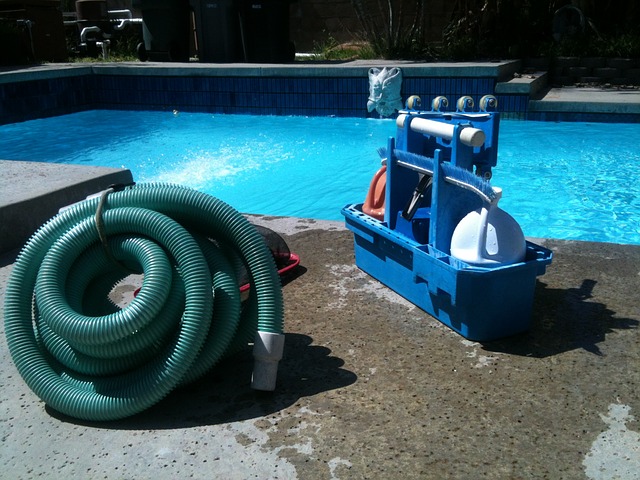


The most important reasons to keep your pool clean
If you regularly add chlorine to your pool, then you’re already practicing good pool cleaning habits.
However, if you’re only adding chemicals, but not scrubbing, skimming, and vacuuming, then that’s a problem.
Not only does that make your pool get dirtier faster, it also eats up pool chemicals like a black hole. Because a dirty pool demands at least 3x as much chemical treatment as a clean pool does. That’s a lot of unneeded expenses.
But it’s really no different from your kitchen sink, or bathtub. The water they hold is clean. But the containers themselves, the sink and tub? Those get dirty over time.
Eventually grime and soap scum starts forming, and if you don’t clean it early on, it only gets worse and harder to clean. That’s why you need to get in there and scrub it down every now and then.
Your pool is similar.
Why ONLY using pool chemicals to keep your pool clean doesn’t work out
While chlorine keeps your water germ free, it can’t get rid of the buildup and debris lurking on the walls and floor of your pool. And it definitely can’t do anything about the all leaves, twigs, and bugs floating in the water.
That’s why brushing, skimming and vacuuming is essential to good pool care. It ensures that every part of your pool, from the surface of the water, to the walls and floor stays clean.
And when your pool stays clean, your pool chemicals last much longer. Like easily twice as long. And that’s not something you want to cheat yourself out of.
Benefits to keeping your swimming pool clean:
- Prevents damage to swimming pool & plumbing
- Greatly reduces wear and tear on pool equipment
- Keeps your water healthy and swimmable 24/7 — more time in the pool
- Prevents bacterial growth and buildup
- Reduces how much you spend on pool chemicals over time
- Reduces pool cleaning time — a clean pool takes less work to keep clean than a dirty one
So now that you know the value of keeping your pool clean, let’s go over what you need, and how to get the job done.
Pool cleaning supplies | What you need to keep your pool clean
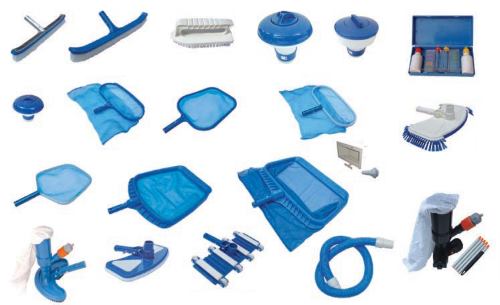


In order to keep your pool clean, you need the right pool cleaning supplies. The tools and chemicals that help you maintain your pool, and keep your water looking crystal clear.
Here’s a quick rundown of everything you need to maintain a clean pool.
Telescopic pole
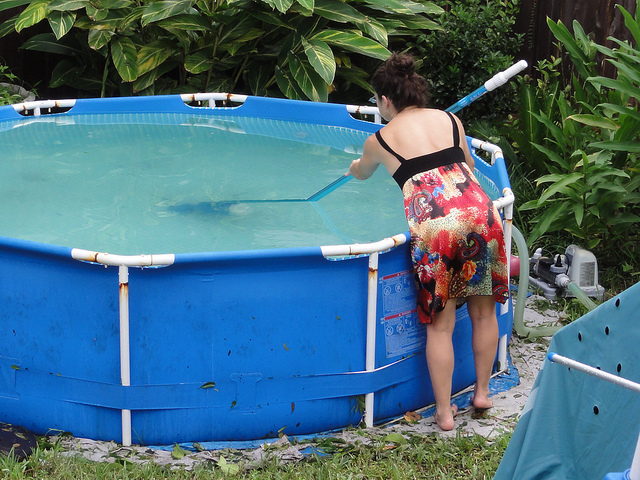


Of all the pool cleaning supplies you own, this one is the most versatile.
A telescopic pole extends up to twice it’s size (usually around 16 feet) and helps you easily reach every part of your pool — from the walls to the floor.
Plus, you can attach a skimmer, brush, vacuum and more to it, which makes it an indispensable tool for cleaning your pool.
So invest in a good telescopic pole, because you’ll be using it for pretty much everything.
Pool brush
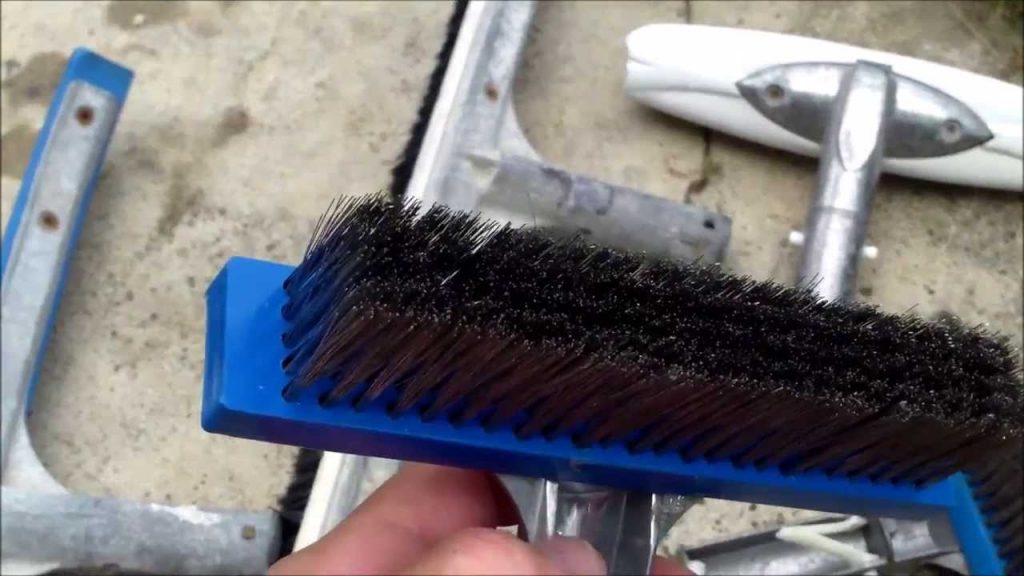


A pool brush lets you easily scrub off any algae or buildup forming on the surfaces of your pool.
And by simply attaching your brush head to the telescopic pole, you instantly have an extendable pool brush.
But for the best results, it’s important to choose the right kind of brush for your pool:
- Unpainted Concrete pools: Use a brush with stainless steel & nylon bristles
- Gunite pools: Use a brush with stainless steel bristles
- Fiberglass, Vinyl, or painted Concrete pools: Use a brush with only nylon bristles
How often to brush your pool:brush your pool walls, corners, and ladders at least 2x per week
Skimmer net
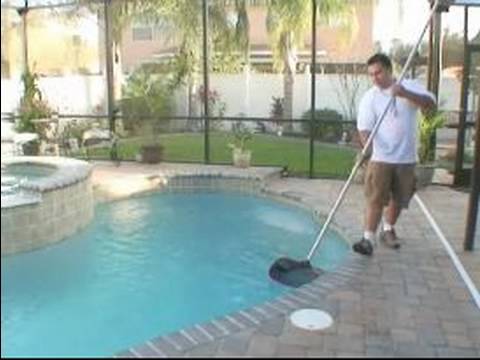


Most of the time when you’re doing light pool maintenance, you’ll be using your skimmer net.
When you attach your skimmer net to the telescopic pole, you can easily scoop out any surface debris on the water. It’s great for picking up stray leaves, twigs, and bugs — but anything that floats can be caught with you skimmer.
There are two main types of skimmer nets: Flat skimmer nets, and bag skimmer nets
Flat nets are easier to use and empty, but hold less than bag nets. In most cases, flat nets are the better option for those looking to get the job done faster.
How often to skim a pool: Skim your pool water at least 2-3 times per week
Vacuum head & hose (manual vacuum)
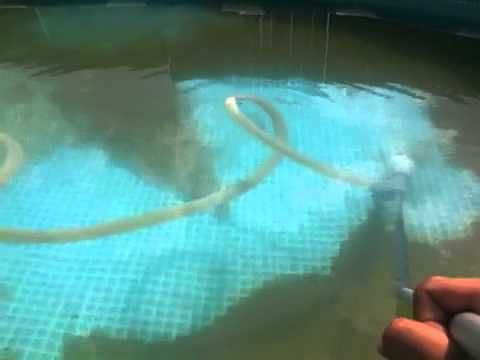


If you’ve ever wondered how to clean dirt from the bottom of your pool, a manual vacuum is the answer.
Setting up a manual vacuum is as easy as clipping your vacuum head attachment to your telescopic pole, and running the vacuum hose to your skimmer. From there, you just push the vacuum up and down the length of your pool floor, just like a regular vacuum.
Vacuuming your pool makes it easy to pick up and leaves, sand, dirt, or debris sitting on the floor of your pool. Especially anything that falls to the floor after your brush the walls.
But while manually vacuuming your pool floor is always reliable, there are better and easier ways to keep your entire pool clean and free of debris.
How often to vacuum your pool: Vacuum your pool at least once per week, or after each brushing
Related: How To Clean a Swimming Pool With a Manual Vacuum
Automatic pool cleaner (Recommended)
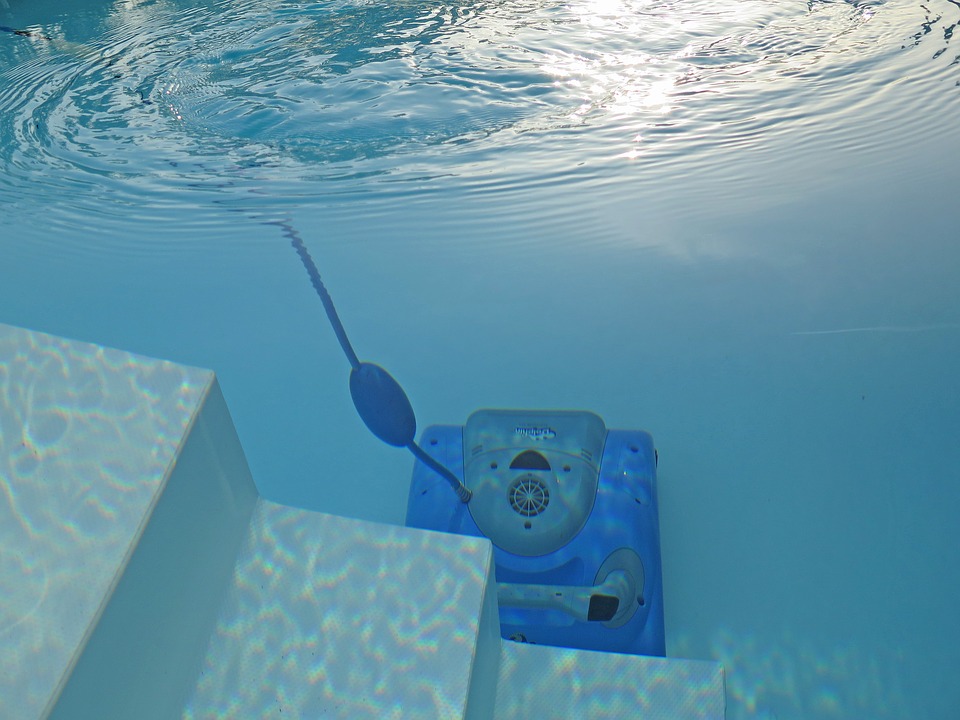


For anyone who read the paragraph about manual vacuuming and sighed, this one is for you.
Some automatic pool cleaners can vacuum AND brush your pool for you. Which saves you both a ton of time and work.
But the type of automatic pool cleaner you choose makes a difference. Each type comes with strengths and weaknesses.
Robotic pool cleaner
Of all the options, a Robotic pool cleaner is the best choice for anyone looking for a truly automated, set it and forget pool cleaner.
They’re electronically powered, self contained pool vacuums that travel across the walls (yes, they climb walls) and floor of your pool, brushing and vacuuming everything they pass over.
So while you enjoy a fresh lemonade and tanning session, this little robot buddy handles the most physically demanding pool maintenance for you.
The only downside to robotic pool cleaners is the price tag. They cost the most out of any of the three pool cleaners mentioned. That said, they last a while and save you a ton of work, so invest in a good one.
Suction side pool cleaner
A suction side cleaner attaches to your skimmer, like a regular vacuum, but also moves itself across your pool surfaces. The suction force created by your skimmer is what pushes the cleaner across.
While they work greatly for keeping your walls and floor clean, suction side cleaners also come with a big flaw: they’re not self contained, so they feed everything they pick up directly to your filter system.
In most cases this is okay, but if there’s ever a rock or large concentration of debris on the floor, it can quickly clog up or damage your filter.
For this reason, we recommend using a suction side cleaner in combination with regular brushing and vacuuming.
Pressure side cleaner
These work similar to suction side cleaners, except for two main differences:
- They attach to your return jet instead, creating a water vortex that pushes debris into a mesh bag
- They’re self contained and feed debris to a mesh bag instead of your skimmer
Pressure side cleaner work more effectively than suction side cleaners, but won’t clean as thoroughly as robotic cleaners.
Pool deck cleaner or trisodium phosphate
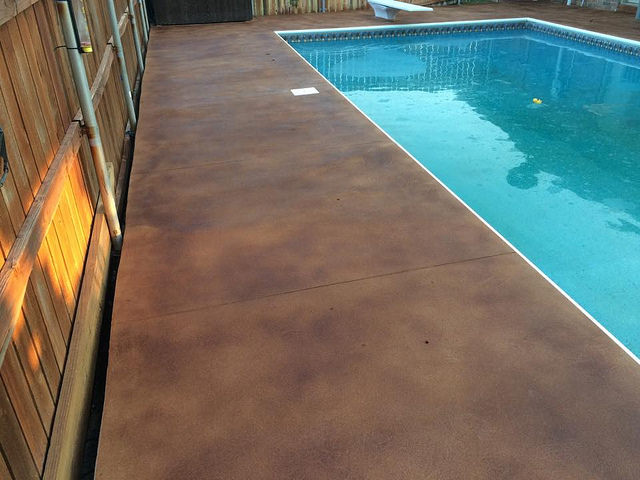


Any water that splashes out on to your deck contributes to buildup and bacteria growth over time. Especially once the sun drys up all the chemicals in it. The same chemicals that were keeping that water clean and sanitary.
Over time, this causes your pool deck to form a slippery and grimy layer that’s unsafe to walk on, and very unappealing to look at. Not to mention all the bacteria.
This is why it’s important to clean your pool deck. And for that, you really only need two main things:
- Pool deck cleaner OR a trisodium phosphate cleaning solution
- A long soft bristled brush for scrubbing the deck
Related: How To Clean Your Pool Deck (And Everything Else Around It)
Basic pool chemicals
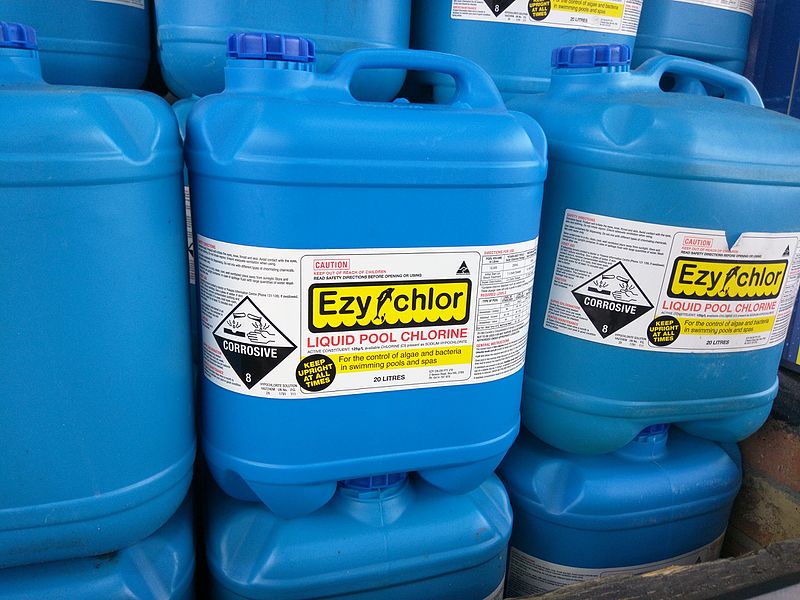


Keeping your pool chemically balanced is just as important as keeping it physically clean. It keeps your water healthy and swimmable, and prevents buildup and stains from forming.
Here are all the basic pool chemicals you need to keep your pool clean:
- Sanitizer (chlorine or salt water system)
- pH Booster
- pH Decreaser
- Alkalinity Booster
- Alkalinity Decreaser
- Pool Shock
- Metal Sequestering Agent
- Algaecide
You can learn everything you need to know about using these chemicals in this post: How To Balance Your Swimming Pool Water in 7 Easy Steps
How to keep your pool clean
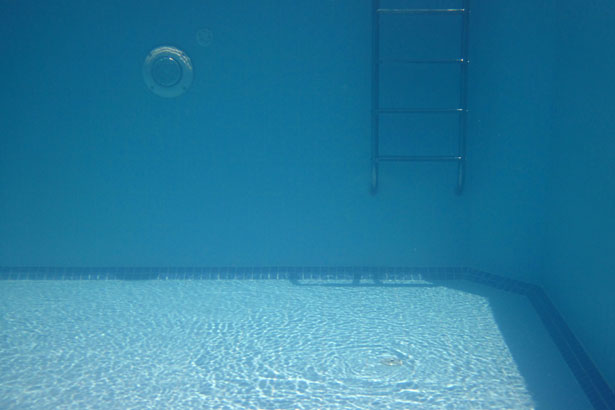


Now that you know which supplies you need, here’s how to use them to keep your pool clean:
10 Easy Steps To Cleaning a Pool
- Skim your water at least 3x per week
- Brush your pool at least 2x per week
- Vacuum your pool 1-2 times per week
- Test & balance your water at least 3x per week
- Total Alkalinity: 80 – 120 ppm
- pH: 7.4 – 7.6
- Calcium Hardness: 200 – 400 ppm
- Chlorine: 3 ppm
- Total Dissolved Solids: less than 2,000 ppm
- Shock your pool once a week
- Clean your pool filter at least 2x a month
- Clean the pool deck at least 2x a month
- Empty out your pump and skimmer baskets every week
- To prevent staining, add a metal sequestering agent & pool enzyme solution
- Add a biweekly algaecide to prevent algae growth
About Chlorinators, Salt Systems, Ozonators, and UV systems
If you don’t want to manually add sanitizer to your pool each week, you can have a machine do it for you. The true beauty of pool automation.
Chlorinators hold a bulk of chlorine tablets, and automatically dissolve them into your water based on a preset feed rate.
Salt systems use pool salt and a salt cell to produce chlorine on the spot.
Ozonators, or ozone generators, use bubbles to oxidize contaminants in your water over time.
UV systems work by killing off any bacteria that passes through their light. They’re great for supplementing a pool sanitizer, but not replacing it.
Why checking your water level is SUPER important (don’t skip this one)
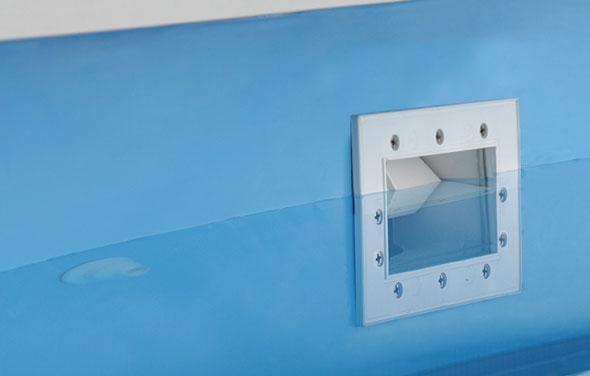


For regular use, always keep your pool water line at mid skimmer level. It’s the only way your skimmer and pool system can work properly.
When your pool water is at mid skimmer, your skimmer line can pull in water and debris. This maintains consistent pressure throughout your pool system, and keeps the surface of your water clean.
But when your pool water line drops below mid skimmer level:
- Pressure buildups happen, causing damage to pipes
- Your skimmer stops picking up surface debris, dirtying you pool faster
- Chemicals stop circulating properly, and your water gets unbalanced faster
- Heat transfer gets slowed down drastically
Whenever you see your waterline going below mid skimmer level, grab the hose and replace the water. Or better yet, use an automatic pool leveler to monitor and adjust the water level for you.
How often to clean your pool
We recommend cleaning your pool a minimum of 3x per week. This is enough consistency to keep chemicals levels consistent, and debris buildup at bay.
Using a pool care schedule makes this really easy. It’s just a calendar for the month where you plan out which days you’ll skim, brush, vacuum, shock, or test the water. That way you’re always prepared, and never have to waste time or money.
The secrets to keeping your pool water clear
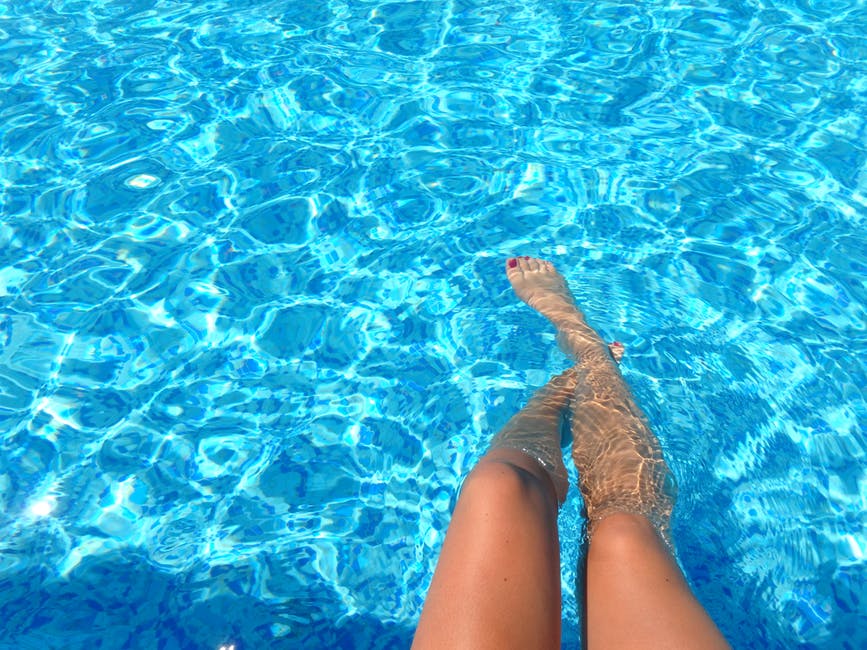


Keeping your pool both chemically, and physically clean is the secret to clear pool water. As long as you follow the steps outlined above, keeping your water clear will be easy.
That said if you’re looking to get that picture perfect, crystal clear pool water, check out this post: The 7 Secrets To a Crystal Clear Swimming Pool
How to keep your pool clean cheaply
When it comes to keeping your pool clean for a low cost, once again, consistency is key.
By remembering to balance, clean, and shock your pool each week, you’ll spend less on pool chemicals over time (because there’s less and less to clean). Plus, you’ll eliminate the chance of any surprise algae or cloudy water issues.
As mentioned earlier, the easiest way to do that is by sticking to a pool care schedule — setting up specific days for vacuuming, skimming, brushing, shocking, and balancing the water.
This keeps cleaning work light, and reduces chemical demand, which saves you TONS on pool chemicals.
How to clean a green swimming pool
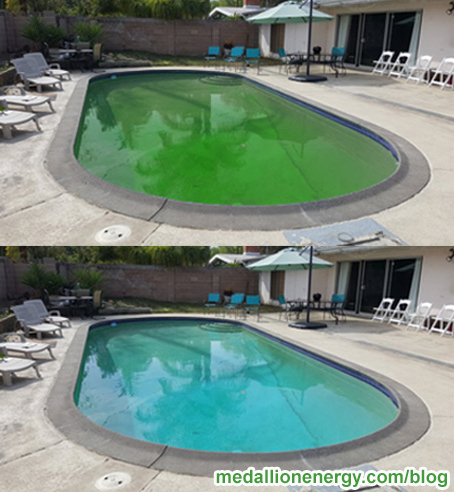


The key to preventing your pool from turning green, lies in good pool maintenance. So if you do everything in this post regularly, from balancing your water, to brushing, skimming, vacuuming, and shocking it, pool algae won’t be a problem.
Because when your water is clean, and your pH and sanitizer levels are in balance, algae can’t form. Period.
It can only form when your pH and sanitizer levels are too high or low.
But if your pool is already green, there’s a simple process for fixing it:
- Lower your swimming pool’s pH
- Shock the pool
- Add flocculant
- Vacuum the pool
- Add an algaecide
For detailed instructions, check out this post:How To Fix a Green Pool In 5 Easy Steps
How to keep a pool clean without chemicals
Here are a few ways to keep a pool clean without chemicals:
- Use a salt water chlorine generator
- Biguanide or bromine as a chlorine alternative
- Use a UV generator to kill of contaminants
- Use an Ozonator to oxidize and eliminate contaminants
- Mineral sanitizer for natural bacteria fighting ionization
- Keep it covered to reduce debris
Note: These tools only help sanitize your water. You’ll still need to keep all the other chemicals in your water (pH, Total Alkalinity, Calcium Hardness) balanced
How much does it cost to have someone clean your pool?
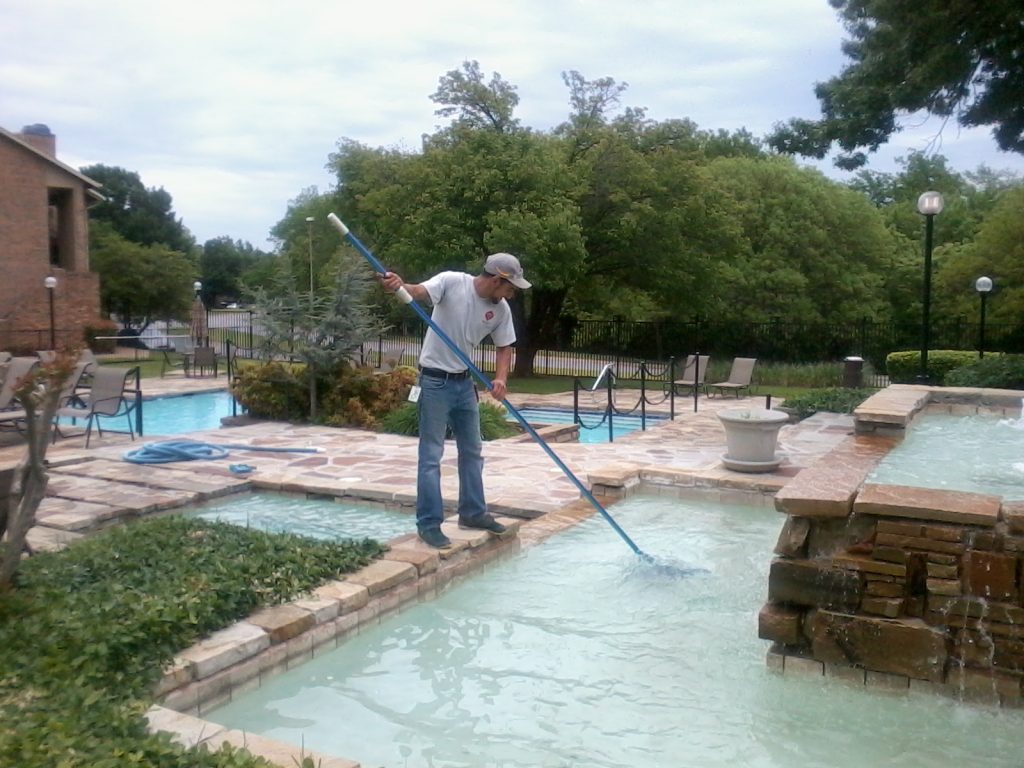


The price of most pool cleaning services ranges from $75-$150 per cleaning. This usually includes all the basics mentioned in this post.
But overall, what you pay usually depends on what the pool cleaning package includes, and the frequency of cleaning.
For instance, a few additional pool cleaning services you might use are:
- Pool acid washing: $200-$300
- Filter cleaning: $75-$100
- Pool restoration: $300 – $600
- Opening & Closing pool: $150-$300
A pool cleaning service can jump in and help you keep things tidy when you’re away for a long time, or just too busy to keep up with maintenance.
Most important of all, keep your pool equipment clean & serviced
Without a working pool pump, filter, and heater, odds are, you’re not swimming.
Which is exactly why cleaning and servicing your pool equipment is so important. When you forget to do it, a lot of bad things can soon happen:
- Pool heater malfunctions, and you lose your ability to control the temperature of your pool and swim when you want to
- Pool heater loses energy efficiency from wear and tear, consuming more energy and increasing costs each month
- Filter clogs and raises the pressure of your pool system, damaging plumbing and other equipment
- Dirty filters let more contaminants cycle back into your water, making it unclean and unhealthy
- Your pool pump breaks down, which powers your entire swimming pool system. No more swimming.
- All of your equipment breaks down faster, cutting it’s lifespan in half (you’ll have to replace it sooner)
Related: 4 BIG Reasons To Service Your Pool Equipment
Closing thoughts on keeping your pool clean like a pro
Keeping your pool clean like a pro is all about having the right tools, and knowing how to use them. For you as a pool owner, that means:
- Skimming 2-3 times per week
- Brushing at least 2x per week
- Vacuuming at least once a week
- Testing & balancing your water at least 2x per week
- Keeping your water level at mid-skimmer
- Cleaning & servicing your pool equipment regularly
- Being consistent
If you liked this post, you might also like:
7 Easy New Year’s Resolutions For Pool Owners
21 Pool Maintenance Mistakes That Are Wasting Your Time & Money
11 Simple Pool Landscaping Ideas To Fit Your Budget

